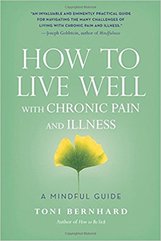
In terms of dealing with chronic illness, we consider practical tips to be those associated with comforting ourselves with aromatherapy, diet and body work, making things easier for ourselves with adaptive technology, and the like. Yes, those physical comforts are wonderful, and often a necessity. But if you don't deal with the state of your mind and how you respond to your situation while you're at it, you are not going to live well. You will suffer. You know what I'm talking about. This is where the mindfulness, or paying attention, comes in. As Bernhard states, "This is mindfulness practice - mindfulness infused with compassion for ourselves."
Reading Toni Bernhard's latest book, How to Live Well with Chronic Pain and Illness, I found something on every page that made me say out loud, "Yes! Yes! Yes!" And there was also something there to make me pause and then say "Ah!" The foundation of all of Bernhard's books come from a long-time practice of Buddhist mindfulness woven into the fabric of her experience with long-term chronic illness. The title of the Introduction to her latest Mindful Guide is "Making Peace with a Life Upside Down." That says it all.
If you aren't convinced that mindfulness practice is practical, all you have to do is read the titles of the first six parts of the book:
- Skills to Help with Each Day
- Mindfulness: Potent Medicine for Easing the Symptoms of Chronic Illness
- Responding Wisely to Troubling Thoughts and Emotions
- Special Challenges
- Isolation and Loneliness
- Enjoy the Life You Have
Our day to day dealings with chronic illness or pain usually include talking to others about how we feel, making decisions about treatments, minding our symptoms, and requesting help. Bernhard echoes what I've often said about being chronically ill: it's a full-time job. She doesn't decide for us or make a case for making the never-ending decisions one way or another. Instead, she acknowledges the difficulties we face every day in making these tough decisions while offering practical, mindful ways to approach the process.
Part of mindfulness practice is patience. What patient has patience?? We're constantly waiting on something: a glass of water, a doctor who has left you alone in the exam room, the verdict of a test result, for the meds to kick in, for the next symptom to occur. Yet the process of mindfulness - of slowing down, becoming aware of the moment, of our surroundings, noticing what thoughts and feelings are coming up - brings us to a point where we fully acknowledge that moment and patiently await the next. This patience transfers to our dealings with situations, with others, with ourselves and our broken bodies. We see the thirst, the anxiety and apprehension, the disappointments and the discomfort for what they are without attaching our selves to them. It's a process of letting go.
Bernhard covers hard topics, such as chapter 19, "The Special Difficulties Faced by Young People Who Are Chronically Ill." She acknowledges sensitively the challenges the younger person faces with being told they're too young to be that sick, isolation and missing out on a social life, completing school, getting a job, stigma, romance and child bearing/raising. Her words gently steer the focus to positive, practical ways of dealing with the challenges. In Part VII, she also offers a sizable chunk of mindful guidance for family, friends, caregivers and others who aren't quite sure how to deal with you.
I loved one of her final chapters, True Confessions, where Bernhard bares her soul and admits her "imperfections" to us. Some of her confessions gave me the giggles, some gave me pause because I knew exactly what she meant, and I couldn't help but think how brave she is to acknowledge these things in print. But that is where perfection lies: in being honest and in the moment, acknowledging our humanness - that is perfect, whether we're sick or well, Buddhist or non-Buddhist.
You don't have to be a Buddhist to learn mindfulness or to benefit from this book. I highly recommend this comforting, highly-readable and immensely practical book to anyone who is at their wit's end with their life with chronic illness or pain, or anyone who doesn't want to reach their wit's end. There's nothing mysterious or difficult about mindfulness. It's as simple as paying attention to your breath. Bernhard will gently take you there. The results are breathtaking.
Links to purchase this and Toni Bernhard's other two books can be found at tonibernhard.com

 RSS Feed
RSS Feed